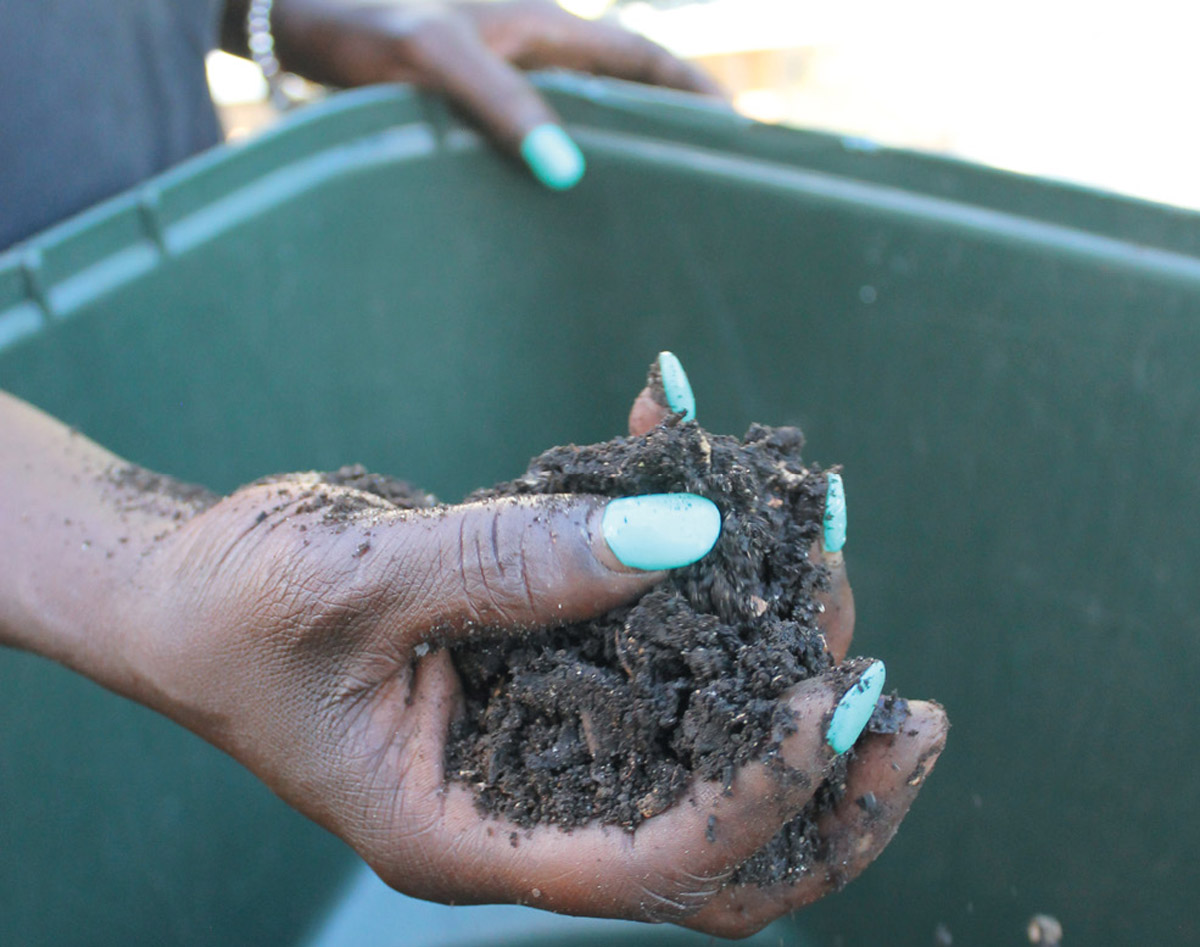Tetee Kromah is Composting for the Community
“Composting is a survival move,” says Tetee Kromah, a Liberian refugee who lives in Providence. “I could put my food scraps in a pot, make soil and grow a garden. Everything I do is a survival move.”
For Kromah, working in the garden and composting are ways of working through trauma she endured growing up in Liberia during a 14-year civil war that resulted in the deaths of between 150,000 and 250,000 men, women and children and displaced over half the population. She learned about composting from her grandmother, Massa Majah Sherman, who would separate their family’s food scraps and put them under the banana trees to ensure the trees thrived.
Kromah, like many women of color, is on the front lines of climate justice. Globally, women of color face disparate outcomes as a result of climate change; their communities and livelihoods are more susceptible to poor air quality, poor soil and other legacies of industrial pollution. Locally and globally, composting is one way to keep food scraps out of landfills and reduce landfill methane emissions, an underreported source of the gasses that contribute to climate change. Much of the soil in Providence has been depleted of organic matter through over 200 years of industrialization and urbanization, but just like her grandmother’s, the compost Kromah produces is bringing life back to urban soil.
Kromah left Grand Cape Mount County in northwestern Liberia over 30 years ago when she was 10 years old and fled, like many Liberians, to the United States, first to Baltimore and then finally to Rhode Island. Although she hasn’t returned to Liberia since she left in the early 1990s, she hopes to visit her birthplace one day. Since that time, Liberia has transformed from being one of the most volatile places in West Africa to one of its most peaceful nations. Nevertheless, to this day, Kromah takes medication to help cope with the lingering effects of war and she finds tending to the gardens and creating compost to be therapeutic because of the inherent quiet.
After raising three children, Kromah completed Groundwork Rhode Island’s (GRI) adult job training program, and worked on GRI's GroundCorp landscaping team for several years. GRI is a community-based organization that helps build healthier, more resilient and more equitable urban communities through a variety of environmental stewardship programs that train and employ Rhode Islanders, especially those from lower-income communities of color. (GRI is part of the Groundwork USA network.)
Kromah switched over to GRI’s Harvest Cycle compost program in 2018 and since then, she has been processing food scraps, overseeing the urban West End community garden on Ring Street and the compost processing that happens there. Before it was a community garden, it was a trash-filled parking lot which was reclaimed by GRI to add crucial greenspace into the neighborhood. Instead of the bombs and guns from her childhood in Liberia, Kromah surrounds herself these days with the sounds of birds or the rustling of leaves. Her favorite plants in the garden are tomatoes and peppers and she takes joy pointing out all the edible bounty to anyone who visits. She also relishes sharing the joys of and the importance of composting, which involves mixing food scraps with carbon-rich materials. In this respect, Kromah is the head chef: She knows exactly how many food scraps should be mixed with how many leaves and wood chips, she knows exactly what to do if the pile is too odorous, or if something seems amiss. She knows when to mix the compost and, by wielding her aerating tool and working the blend, how long to let it cure and how to avoid pests.
Because of her experiences in Liberia, combined with the training she received through GRI, Kromah now has the expertise to handle thousands of pounds of food scraps and to turn them into something useful. With her help, Harvest Cycle is actively reducing the amount of food waste going to Rhode Island’s overburdened Central Landfill, cutting down on the amount of pollution released into the atmosphere and all the while training and employing others to revitalize the urban environment they call home. She’s also changing the narrative of what superheroes look like. She doesn’t own a tech company, she doesn’t dress in suits, but instead, Kromah walks the gardens on Ring Street taking pleasure in finding grubs and getting her hands dirty, demonstrating the healing power of building soil, community and connecting with the environment.
Creating a closed loop where food waste is transformed into compost and distributed back into the community is the backbone of community composting. It relies on individuals like Kromah to oversee the composting where the end product—the nutrient-rich composted food scraps—benefit the soil and everyone who lives in the local community. Individuals can compost in their own backyard if they have one, but community composting also prescribes drop-off sites or residential pickup. These two services are offered by GRI’s Harvest Cycle to make urban composting more practical for city residents who may not have the time or space to do it themselves.
Climate change and racism are two of today’s largest and fundamentally intertwined environmental and social challenges, but Kromah is a living example of how one can be resilient in the face of both issues. She possesses the special skills and the knowledge to help Providence handle its food scraps and turn them into something worthwhile, instead of just letting them fester and rot in the landfill—and the impact of her efforts reaches beyond the neighborhood in which she works.
“I’d rather hear the dogs bark,” Kromah says as she turns over the compost pile. “I’d rather hear the birds chirp. If everyone would respect nature, the world would be a better place, don’t you think?”
Tyson Birch is a writer, compost hauler with Harvest Cycle Compost and resident of Providence, Rhode Island.
For more information, find GroundworkRI at GroundworkUSA.org.






